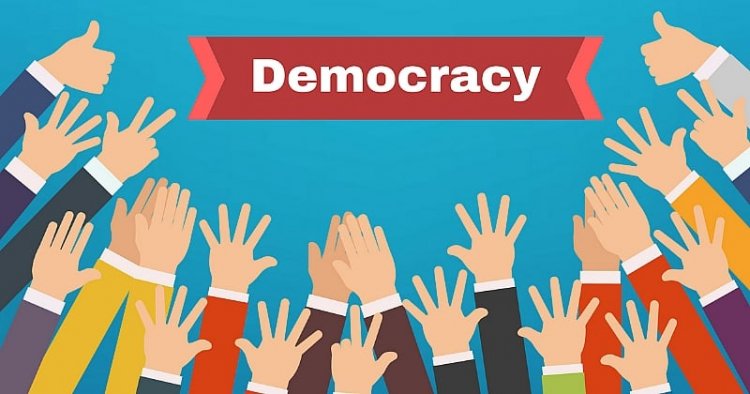What Democracy Does … And Does Not Do
This essay evaluates the real-world outcomes of democracy amid growing global democratic disillusionment. Drawing on extensive comparative research, the author argues that democracies generally foster longer lives, more education, greater peace, and sustained economic growth, though not always with consistent quality or speed.

Maya Tudor (Maya Tudor is professor of politics and public policy at the Blavatnik School of Government and fellow at St Hilda's College at the University of Oxford. Her most recent book is Varieties of Nationalism)
This essay evaluates the real-world outcomes of democracy amid growing global democratic disillusionment. Drawing on extensive comparative research, the author argues that democracies generally foster longer lives, more education, greater peace, and sustained economic growth, though not always with consistent quality or speed. While autocracies sometimes achieve rapid gains, they also produce volatility, repression, and data manipulation. The essay highlights democracy's advantages in accountability, press freedom, and institutional checks, which collectively enhance societal well-being. The author concludes that, on balance, democracy offers the strongest odds for healthier, more stable, and prosperous societies.
As the twentieth century drew to a close, the global rise of democracy—free and fair elections, civil liberties for most citizens, and institutional constraints upon elected executives—was perhaps its most important political development. Democracy, ideologically attractive to much of the world, seemed to epitomize both progress and prosperity. A quarter of a century later, democracy is no longer the global ideal. Instead, democracy is eroding across the globe through the actions of populist leaders who use majoritarian nationalism to dismantle executive constraints and diminish robust civil liberties. Citizens, too, are losing faith in democracy.
One reason democracy is eroding as an ideal, some suggest, is because democracies are worse at delivering social progress. Doubts over whether democracy effectively promotes growth, alleviates poverty, and creates healthier, more educated, less violence-prone societies are fed by the spectacular economic growth of autocracies such as China. Moreover, in some of the world's oldest democracies such as the United States and the United Kingdom, political polarization is increasingly leading citizens to prioritize their own party's access to political power over the robust freedoms that define democracy. In my own classroom, populated by students from about sixty countries, I hear future policymakers asking pointed questions about whether democracy provides solutions to their societies' pressing problems. Simply put, both citizens and policymakers today are less concerned about what democracy is than with what democracy does, and does not, do.
There are normative reasons to care about democracy. As Amartya Sen argued in these pages in 1999, any expansive definition of a life [End Page 5] well lived will include robust rights to deliberate over differing ideas of the good life and to assemble with others to debate shared ideas. But at a time when some policymakers feel that they face a choice between pursuing growth and protecting freedom, we need a full empirical assessment of what democracy delivers in the domains of health, education, security, and growth based on the most recent and sophisticated research from a wide ambit of peer-reviewed articles.
Democracy is, as Joseph Schumpeter wrote in Capitalism, Socialism, and Democracy (1942), "that institutional arrangement for arriving at political decisions in which individuals acquire the power to decide by means of a competitive struggle for the people's vote." But even this minimal definition requires most citizens to be able to vote for the highest political office and legal protections for speaking, writing, and assembling that fundamentally enable government competition and the presence of horizontal constraints on executive power that prevent elected leaders from declaring themselves absolute rulers. Democracy is not just elections, but a group of institutions that protect democratic rights between elections.
Definitively establishing the causal effect of democracy on any outcome is difficult because democracies are not randomly distributed around the world. No scholar can rule out that other unobserved factors may drive democracy's correlations. Scholars using different methodological approaches, different models, or different data, or examining different time periods may emerge with contradictory findings. Nevertheless, most scholarship shows that democracy delivers longer human lives and more years of schooling, promotes domestic peace, and encourages economic growth.
Democracy Delivers Longer Lives
All societies want their citizens to live long lives. The overwhelming scholarly consensus, based on more than fifty recent peer-reviewed statistical analyses using large, global datasets, is that democracies are significantly better than authoritarian regimes at preventing early death. Notably, however, democracies' health advantages do not exist for other crucial outcomes, including child malnutrition, diarrhea prevention, and immunization coverage.
Controlling for alternative causal factors, researchers find that democracies have significantly lower rates of both infant and child death. Based on a global set of cases between 1962 and 2002, being a democratic instead of an authoritarian country meant seventeen fewer infant deaths per one thousand.1 A study of developing countries found similar positive associations, conclusions that were duplicated in regional studies.2 Research following tens of thousands of mothers through democratization in sub-Saharan Africa found that the death rate for infants [End Page 6] born to the same mother dropped 1.8 percent when multiparty elections produced a new leader, while death rates remained unchanged where elections merely ratified the rule of an incumbent leader or where no electoral contest was held at all. Only two prominent studies and a minor subset of cases in others draw contrary conclusions,3 often attributing exceptions to unique regional and historical factors.
Democracy does not just protect infant and child health, but confers similar benefits for adults. A recent global study confirmed democracy's significant associations with both life expectancy and infant mortality. Another global study found that increases in fair elections and civil liberties (as measured by V-Dem's liberal-democracy index) were strongly associated with decreases in premature male mortality. A global study between 1980 and 2016 suggests that a single point increase in a country's democratic history, a measure of the quality and depth of a democracy, reduced deaths from a range of noncommunicable diseases by 2 percent—an even stronger predictor of within-country changes than GDP. Democracies' association with longer lifespans holds even when state capacity is low, according to an eighteen-country study in Latin America.4
Still, democracy's protective effects on child mortality are average effects, which means that some authoritarian regimes are exceptions. For example, Cuba's infant-mortality rate is reported to be lower than that of the United States and has long been lauded as the lowest in Latin America, due to Cuba's robust commitment to training large numbers of physicians and providing free universal healthcare. Similarly high healthcare spending is frequently found in powerful single-party regimes, a relatively rare form of autocracy. But the extent of Cuba's success is also probably exaggerated, since the ratio of late-fetal to neonatal deaths is nearly double the highest rate of other surveyed countries,5 with epidemiologists, demographers, and public-health experts noting that physicians in Cuba are under political pressure to report low rates of infant mortality.
Researchers seeking to understand why democracies deliver lower mortality suggest that causality probably runs through multiple channels that shape democracies' greater responsiveness. One factor is probably greater media freedom to report on government failings, with scholars finding that a transition to a fully free press was associated with a More (But Not Neces1.6-year average increase in life expectancy.6 Other scholars show that high levels of election quality led "unambiguously to health improvements," including longer lifespans.7 A comparably broad study found that democracies have less public-sector corruption and thus "higher levels of health system efficiency."8 Democratic governments generally do allocate a larger share of resources to public-health spending, which enhances health infrastructure and coverage and thus contributes significantly to improved population health outcomes.9
However, democracies' positive effects are weaker in contexts that [End Page 7] lack universal healthcare or which have undergone neoliberal reforms. Research on sub-Saharan countries between 1995 and 2019 finds that democracy's advantage depends on the strength of component democratic institutions as well as broader social cohesion. Across Africa, infant-mortality reductions appear only in rural areas, possibly because large rural majorities give politicians electoral incentives to favor rural voters. More generally, poor and socially marginal citizens are less likely to share in the public benefits that democratic systems provide.10
More (But Not Necessarily Better) Education
Most citizens want governments to provide their children with educational opportunities that pave the way to prosperity. Controlling for income, a broad range of scholars robustly find that democracies provide more years of education across regions and time periods. Recent global scholarship shows that when a regime moves from the least to the most democratic category, schooling increases by, on average, 1.3 years.11 And, controlling for alternative explanations and country-specific trends, countries that transitioned to democracy increased their secondary-school enrollment over the next fifteen to twenty years by almost 70 percent, relative to what would have been expected if the country had remained autocratic.12 This pattern almost uniformly holds across global and regional studies.
Even where state capacity is low, scholars find that democracies provide greater access to schooling, likely because electoral accountability encourages politicians to prioritize measurable and salient accomplishments, such as abolishing primary-school fees. Political competition is often the engine leading to more investment in schooling, with governments in Africa spending more on primary education, especially after multiparty elections; the presence of legislatures and parties without multiparty elections does not improve human-development outcomes. Across Latin America, democracies spend a greater share of their GDP on education than do autocracies, especially at the primary-school level.13
Democracies provide more education on average, but such averages mask variations in education provision among both democracies and autocracies. Autocracies, however, show greater variation in education outcomes than democracies do. But democracies with powerful landed elites, such as Guatemala and Paraguay, provide less education than the average autocracy because agrarian elites wish to keep cheap agrarian labor. They are therefore particularly likely to oppose the creation of public education, which offers opportunities to acquire skills and knowledge.14
Although democracies spend more than autocracies on education, such spending does not consistently translate into improved educational outcomes, which are notoriously difficult to measure. Scholars hypothesize that while the provision of education is observable to parents and [End Page 8] citizens, the quality of that education is not, which is why electorally accountable regimes may not invest in providing high-quality schooling. Some scholars do, however, find that democracy is associated with better reading skills.15
Democracy and education levels likely have causal effects running both ways. Historically, state-controlled primary education emerged well before global waves of democratization. In three-quarters of countries that have democratized, a popular majority already had access to primary education. Still, educational attainment often significantly improves democracy levels, an effect that is markedly stronger in poorer countries. Higher education levels make democracy more likely to emerge and persist because they are associated with increases in civic participation, a relationship which holds across and within countries over time. Higher education levels are particularly likely to increase the probability of democratization when they extend to both boys and girls, and when the country in question is well integrated into the world economy.16
In sum, democracies are associated with more education in terms of average years of schooling, education spending, and student-enrollment rates across regions and levels of state capacity. Autocracies, in contrast, vary more in their provision of education, which is on average lower. Higher levels of education provision are not well correlated with educational quality, though some scholars do find some evidence of better reading skills in democracies. While the introduction of multiparty elections likely leads to greater investment in education, the reverse is also true, making causality particularly difficult to establish.
Democracy Promotes Peace
A government's most basic task is securing the monopoly on violence. All citizens want a guarantee of physical safety. Democracies are more likely to minimize violent conflict within their own borders and with other democratic states, though not with autocratic states. Democracies also have a better record of preventing mass civil violence at home. Recent scholarship finds that high-quality democracies are more peaceful than low-quality democracies, but also that party-based autocracies with elections are more internally peaceful than autocracies without elections.17 These findings underscore how both the quality of democratic institutions and the democratic institutions themselves mediate the prospects for peace. Former military regimes are particularly prone to civil violence since the presence of a powerful military opposed to democratization creates incentives for the military to use violence when political or economic interests are threatened, as recently happened in Burma with the 2021 military coup.18
While democratic institutions are generally associated with reduced [End Page 9] civil conflict, scholars also show that introducing competitive elections too quickly after periods without elections can induce violence, especially when actors are uncertain about how power will be shared and when postconflict politicians cannot commit credibly to respecting the peace.19 Ethnic civil wars are substantially more likely to break out during the first and second elections after democratization.20 Because democracy is a set of institutions, it is particularly important for potential losers to believe that those institutions will fairly allocate power in the long run. This is why post–civil war countries that adopt extensive power sharing among formerly warring parties—for example, Bosnia and Herzegovina after the Dayton Accords, Mozambique after its 1992 civil war, and postapartheid South Africa—are ultimately more successful in transitioning to democracy.21
Introducing democratic institutions in uncertain political environments does not always lead to greater violence. Recent scholarship examining events rather than high-level regime change suggests that incremental movements toward democracy are associated with reduced internal conflict. Across Africa, for example, elections are associated with a 13 percent decrease in political violence in the short term and a 37 percent decrease in the long term.22 Moreover, external support for democratization from donor countries and international organizations has been shown to minimize risks of reverting to conflict, especially when foreign-aid strategies prioritize ending violent conflict before democratization, creating incentives for cooperation, and supporting institutional constraints and competition.23
While the scholarly evidence is robust that democracies are far less likely to fight wars with one another, democracies are equally likely (and some scholars suggest more likely) to go to war against nondemocracies, with the United States being a particularly notable aggressor against nondemocracies. In the seventy-plus years since the Second World War, no democracy has declared war against another democracy, although scholars dispute specific cases. That democracies do not go to war with one another, however, is empirically well substantiated, with scholars finding that the "relationship between democracy and peace [between states] is at least five times as robust as that between smoking and lung cancer" and that "the existing empirical evidence overwhelmingly supports the democratic peace."24
Democracies do not go to war with one another because three kinds of actors can constrain war-prone leaders. First are citizens who vote. Since a country's population bears the costs of war, elected leaders could lose power if voters do not consider leaders' warmaking decisions legitimate. Second, independent institutions such as legislatures and courts also often scrutinize democratic leaders' decisions and might similarly restrain them. Third, civil society, through public mobilization and activism, may hold leaders accountable. Comparing these three, scholars [End Page 10] find that democracies' accountability to civil society is the strongest and most consistent predictor of peace between states.25
In sum, scholarship shows that democracies are less conflict-prone domestically and with respect to other democracies. Individual democratic institutions, such as elections, rights protections, and horizontal checks and balances, have been individually shown to diminish violence, but they are most effective at preventing violence when they work in tandem.26 Though democracies are associated with less overall domestic violence, it is also possible that the process of democratization can spur on violence. The prospects for violence during democratization are minimized when there is robust foreign support for power sharing and when major social groups view democratic participation as a meaningful route to power.
Democracy Produces Prosperity
Policymakers and citizens all around the globe care about governments' ability to promote economic growth. Simply put, wealthier economies are better able to achieve valued developmental outcomes—some of which, such as higher education, may in turn also boost democracy. The most recent and globally oriented scholarship finds that democracy is positively and significantly associated with higher levels of growth in GDP per capita. While older research was more ambiguous, newer scholarship using more sophisticated methodologies, global samples, more data, and more robustness checks finds the relationship between democracy and growth to be strong and positive.
Of the fifteen peer-reviewed studies published in the last decade using data from a large global sample of countries spanning at least thirty years that specifically examined the relationship between democracy and economic growth, thirteen found democracy to have robustly positive effects. Two other studies found conditional positive effects, showing in one case that democracy promoted growth only in countries with strong preexisting institutions and, in the other case, that democracy's effects worked through indirect channels such as higher levels of education and more political stability. Specifically, studies estimated that democratization generally increased per capita GDP by 10 to 20 percent in the long term.27 No peer-reviewed global study published in the last decade has found a negative effect of democracy on economic growth.
Nevertheless, a few authoritarian regimes receive global attention because they are among the world's fastest-growing economies. Lee Kuan Yew, Singapore's founding leader, famously argued that authoritarian states have a growth advantage because they can more effectively plan for the long term and pass unpopular reforms in ways that democracies cannot. As the leader of a party that, at its founding (and still today), suppressed political competition, Lee had a legitimacy stake in encouraging the idea that autocracies better promote growth. The so-called Lee [End Page 11] hypothesis is still today cited by leading policymakers in countries such as China, Rwanda, Saudi Arabia, and Vietnam.
But the Lee hypothesis is, on average, wrong. Authoritarian regimes have been overrepresented among both the world's fastest-growing and slowest-growing economies in every decade since the 1960s. Autocracies' substantially higher variation in economic growth is a robust relationship that holds in the shorter term, the longer term, and across and within countries. Well-institutionalized party-based autocracies do the best among autocracies in promoting growth. And while autocracies do actually outperform democracies in large growth accelerations, they are also more likely to be associated with large collapses in growth.28 On the whole, autocracies have no general growth advantage—indeed, there is an average growth deficit.
Still, since most cases of fast-growing autocracies are led by well-organized political parties, policymakers may reasonably ask whether they might wish to replicate the conditions which led to the establishment of such parties. For example, contemporary African policymakers speak in glowing terms about Rwanda's economic growth under the leadership of Paul Kagame. Yet policymakers focusing on Rwanda's high growth rates during the past two decades should acknowledge two relevant facts. First, since the middle of the twentieth century, Africa's fastest-growing economy is not autocratic Rwanda but democratic Botswana. Second, the specific circumstance that led Rwanda's government to power was one of the worst losses of human life on the African continent—the 1994 Rwandan genocide. Rwanda's capacious government grew out of exceptional circumstances that no policymaker would reasonably aspire to replicate.
No discussion of autocracy-led growth would be complete without a discussion of China, the most prominent case of the twentieth century. But any celebration of China's unquestionable developmental successes over the past half-century must recognize that the country's growth is powered by the Chinese Communist Party—and the cost at which its unity was achieved. The unity that drove China's unparalleled developmental success also directly powered the Great Leap Forward and Cultural Revolution, two periods marking the largest losses of human life in recorded history absent external wars. Any policymaker assessing China's developmental triumphs must ask whether the cost of achieving such unity would be worth replicating elsewhere. More generally, reviewing high-profile authoritarian accomplishments, scholars conclude: "The persistent belief in [the existence of an authoritarian advantage in promoting growth] is the product of several factors, including an over-reliance on authoritarian success stories and a failure to look closely enough at the less spectacular, but still substantial, development gains that democratic institutions are capable of producing."29
Democracies are better at promoting growth in the long term, but averages will not hold true in every region during every time period. Democracies [End Page 12] outgrew autocracies in South Asia between 1990 and 2018, but autocracies outgrew democracies in the Middle East between 1983 and 2012.30 Moreover, regime types may have differential effects during different periods. Analyses of political trajectories in South Asia over longer periods suggest that democracy can hinder economic growth during transitional moments but promote it in the long run.31 A recent study of several dozen Organisation for Economic Cooperation and Development (OECD) countries over thirty years finds a negative effect of democracy on growth but concludes that this is driven by recent deteriorations in the quality of democracy in OECD countries.32
If democracies are generally growth-conducting, albeit in less spectacularly speedy or absolutely abysmal terms than autocracies, is this relationship causal? Since democracy is itself a cluster concept defined by multiple institutional components, it is possible—even likely—that different aspects of democracy affect growth differently. Yet the preponderance of research suggests that democratization and democracy both, on average, cause growth. Democratization is associated with increases in growth, while moves toward autocracy are associated with decreases in growth—effects that newer research shows to have been underestimated in previous studies.33 Democratic breakdown leads to an average drop of 1.5 to 2 percent in a country's per capita income, increasing to a 4 to 6 percent drop after two decades of autocratic rule. Democracy's growth-promoting effects are clearest when transitions to democracy are fullest, with partial democratizations showing weaker effects.34 Controlling for a wide range of factors, higher democracy levels predict higher rates of growth, while antidemocratic coups predict large, statistically significant declines in economic growth.
Democracy promotes growth through a number of causal pathways. Improving academic freedom by a standard deviation increases patent applications by 41 percent,35 although the relationship between democracy and innovation is not statistically significant. Using machine learning to detect democracy's causal effects on growth, scholars suggest that democracies boost investment shares and lower fertility rates.36 The growth-enhancing effect of democracy is strongest for established democracies with stable political institutions, while case studies of democracy's growth-promoting advantage have focused upon democracies' ability to achieve better policy consensus and to coordinate expectations.37 Democracies are also theorized to spur growth because they tend to provide higher institutional protections for investors.38 [End Page 13]
Since high rates of economic growth can mask the wealthy simply getting wealthier while others are worse off, how do democracies fare on poverty and inequality? Scholarship on this question is mixed: Democracies sometimes outperform autocracies, and sometimes there is no difference. But no study finds democracies to perform worse on average than autocracies in alleviating poverty and inequality. Indeed, one recent global study found democratization to be associated with an 11 to 14 percent reduction in poverty rates, while country-level studies in Indonesia and Kenya find that democratization attenuates group and regional inequalities. Democracies most effectively reduce income inequality when paired with strong welfare states, competitive parties, and robust public services.39
In sum, democracies tend to grow more rapidly and with lower variance than autocracies, though this average relationship does not hold true in every region at every period of time. Fast-growing autocracies tend to be led by well-organized, capacious political parties that sometimes come to power through episodes of extreme violence. The democratic-growth dividend exists and probably works by mitigating the worst outcomes through checks on leadership and by providing stability of expectations. But democracy's growth dividend is not dramatic and can be negative in places and times where institutions are fragile or democratic transitions are incomplete. Democracy mitigates the most abysmal economic outcomes, however, and is sometimes associated with less poverty, less inequality, and more stable economies.
Democracy Delivers
Can we trust this scholarship, given that authors and countries may be prone to bias in support of their own countries' regimes? There is merit in this question since researchers find that studies using subjective measures of democracy are more likely to report positive effects on desirable outcomes than studies based on objectively measured indicators. The best available way to mitigate this problem is to review a wide range of peer-reviewed studies.
Several metastudies still find democracy's average effects to be salutary on a broad range of outcomes.40 Democracy delivers on peace, mortality, years of schooling, and economic growth even when accounting for possible authorial bias. For example, one survey of 188 studies examining 2,047 models finds that democracy "positively correlates to economic growth over and beyond publication bias."41 Moreover, a different kind of bias in growth statistics can work against the finding that democracy delivers because there is evidence that data submitted by autocracies are more prone toward normative inflation. For example, a study of economic growth using the satellite imaging of nighttime lights to measure economic activity finds that dictatorships overstate their annual GDP growth rates by 0.5 to 1.5 percent.42 [End Page 14]
The covid-19 pandemic is a recent illustration of why the autocratic advantage in delivering on broadly valued social goals generally does not exist. When the global pandemic broke out in 2020, China appeared to demonstrate the quintessential autocratic advantage in state capacity. The country's centralized approach meant it was able to quickly implement widespread testing and tracing strategies, enforce quarantines through digital tracking, build hospitals in weeks, redeploy medical personnel to affected areas, sequence the virus's genome, and develop a vaccine. At the start of the pandemic, China presented to the world the very image of the capacious autocratic state.
By the pandemic's later years, however, China's polished covid-control image had dulled considerably. In early 2022, as mounting evidence of the adverse educational, mental health, and economic consequences of strict lockdowns accumulated, many other countries shifted away from lockdowns and toward a strategy of adapting to covid. China, by contrast, maintained its strict lockdown policy throughout most of that year, leading to large-scale anti-lockdown protests across fifty cities. The country relaxed its covid policies in November 2022, and scholars estimate that in the following three months, another 1.4 million people died of covid in China. Shortly afterward, the Chinese Communist Party nevertheless declared victory over the pandemic, and its Politburo Standing Committee reported that the country had the lowest mortality rate in the world.43
Almost every independent public-health expert believes that China's covid death toll was considerably higher than its government claimed. As of June 2023, China reported a covid mortality rate of 8.5 deaths per 100,000 people—one of the lowest covid death rates in the world. Yet independent estimates based on excess mortality rather than government reporting suggest that "China's official reports may underestimate the COVID-19 death toll by a factor of 17."44 A midrange independent estimate of China's covid death toll is 185 per 100,000 people. This is about the same rate as that of Taiwan (184) and South Korea (190), and triple that of Japan (60)—all nearby democracies that did not mandate prolonged strict lockdowns associated with adverse social, educational, and mental health outcomes.45
So while some scholarly studies published in 2020 suggested an authoritarian advantage in preventing covid deaths, more recent scholarly research using longer timeframes, global samples, and robust models has not found a consistent positive effect of autocracy on covid fatality rates.46 Moreover, several researchers have found that autocratic regimes were particularly prone to manipulating covid data, with some scholars suggesting that "any apparent 'autocratic advantage' in fighting the pandemic is likely to only exist in official Covid-19 mortality."47
Policymakers are both planners who prioritize policy goals and poker players who take bets on the policies and institutions likely to deliver [End Page 15] the best future for their citizens. If policymakers follow the principle of avoiding harm, then they should play the odds. And when it comes to delivering longer-living, more educated, less violence-prone, and more prosperous societies, playing the odds means betting on democracy.
Maya Tudor





















